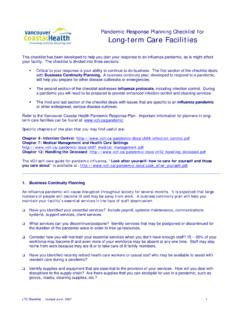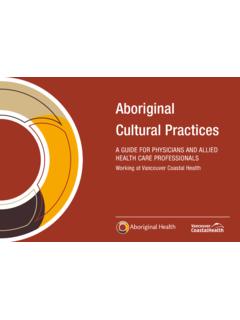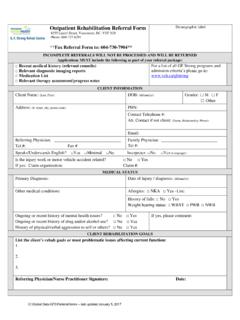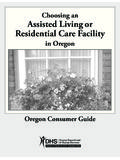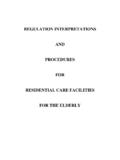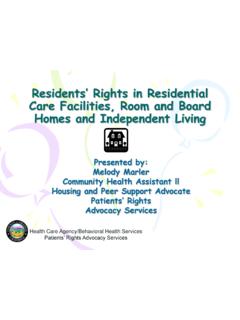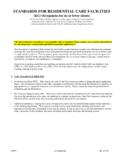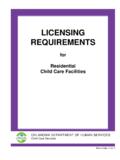Transcription of INFORMATION ON RESIDENTIAL CARE
1 INFORMATION ON RESIDENTIAL care Helping you make the best choice for your care Table of Contents Is RESIDENTIAL care the Right Choice for You? 1 What is RESIDENTIAL care ? 2 How Much Does RESIDENTIAL care Cost? 4 Rate Setting 4 Typical Living Costs 5 How Do I Begin the Process? 6 If You Live At Home 6 If You Are In The Hospital 7 What Priority Access Means To You 7 How Do I Decide Which Facility is Best For Me? 8 What Are My Next Steps? 9 Before You Move In 9 Moving In From Your Home 10 Moving In From the Hospital 10 Becoming Comfortable In Your New Home 11 How Do I Transfer To My Preferred Facility? 12 Do You Have More Questions? 13 Map of RESIDENTIAL care Facilities 14 Choosing A Facility Suggested Questions 17 Special care Units Suggested Questions 21 Resident/Family Moving-In Checklist 22 If you find that your daily care needs and health issues make it difficult to continue living in your home, it may be time for you to look at a safer alternative.
2 The decision to move into RESIDENTIAL care is very personal. It should be made after carefully reviewing your situation, your needs and your options. The goal of this guide is to help answer your questions relating to Vancouver Coastal Health s (VCH) RESIDENTIAL care facilities. The guide provides INFORMATION on RESIDENTIAL care , and outlines the steps that you and your family need to take if you decide that RESIDENTIAL care is the best option for you. If you have more questions after reading this guide, there is additional contact INFORMATION at the back of the guide. 1 Is RESIDENTIAL care the Right Choice for You? You may know RESIDENTIAL care by a number of different names including nursing homes or retirement homes. RESIDENTIAL care provides 24-hour professional care in a supportive environment.
3 Trained staff assists with personal care and daily living activities, such as bathing, dressing and managing medications. RESIDENTIAL care also offers a variety of therapeutic and recreational activities. While services such as meals, laundry and housekeeping are provided for you, every effort is made to help maintain your independence. The goal of VCH is to provide a high level of clinical care in a person-centred manner. All facilities in British Columbia meet provincial quality standards and have been granted a license under either the Provincial Community care Facilities Licensing Act or Provincial Hospital Act. They are also required to meet health, safety and fire regulations, and building codes. 2 What is RESIDENTIAL care ? Facilities fall into three categories: Facilities directly operated by VCH.
4 These are partially subsidized by the government. Additional details relating to cost are covered in the next section. Facilities operated by providers that have a contract with VCH. These are supported, but not directly operated, by VCH. Most of these rooms are partially subsidized by the government, but some facilities also offer private pay rooms. Private pay rooms are not subsidized, which means that all costs are covered by the resident. Facilities that aren t connected with VCH. These facilities only have private pay rooms. Because private pay facilities are not connected with VCH, you need to contact these sites directly regarding INFORMATION relating to their costs and services. 3 What is RESIDENTIAL care ? There are two types of costs associated with living in RESIDENTIAL care : the accommodation and typical living costs.
5 Rate Setting In subsidized RESIDENTIAL care facilities, the government pays for the costs directly related to your medical care , such as nurses. However, you are responsible for paying an accommodation fee towards food and room costs based on your annual income as reported on your tax return. This fee changes every year and is paid monthly. The case manager or hospital team will advise you of the monthly rate after they have completed your assessment. When you apply, you must sign a consent form allowing the government to check your income each year with Revenue Canada. If you do not sign the form, you are automatically charged the highest rate. You may qualify for subsidized RESIDENTIAL care if you: Have complex care needs and are not managing at home, even though you are using all the community resources that would provide safe care in your home or in a supportive environment; Require 24-hour supervision and continuous professional care ; Need RESIDENTIAL care immediately; Are 19 years of age or older; Meet citizenship and British Columbia residency requirements.
6 Only a case manager, hospital discharge or transition services coordinator can help you find out if you qualify for subsidized RESIDENTIAL care . Please see page 13 for additional contact INFORMATION . 4 How Much Does RESIDENTIAL care Cost? Typical Living Costs There are other day-to-day costs just like those you have in your current home, which the facility will charge you. The facility is responsible for letting you know about these additional charges, which are different for each facility. Depending on the facility, these costs may include: Telephone, television cable or Internet charges; Personal hygiene and grooming products; Medications not covered by Pharmacare; Personal needs such as dry-cleaning, hair cuts, and newspapers; Equipment or aids such as hearing aids, walkers, and wheelchairs not covered by Medicare or other benefits; Any health care services including optometry, podiatry (foot doctor), physiotherapy, occupational therapy, dentistry, and ambulance fees not covered by Medicare or other benefits; You may also be charged for services such as labelling of personal clothing.
7 Most facilities welcome your guests for meals, and charge a fee for this service. Many also charge fees for special events or outings, such as drinks at pub nights or bus outings. The facility will provide INFORMATION about any extra costs. 5 How Much Does RESIDENTIAL care Cost? If You Live At Home If you live at home, your first step is to contact Central Intake at 604-263-7377 if you live in Vancouver, 604-983-6740 on the North Shore, 604-278-3361 in Richmond, or 604-485-3310 in Powell River/Sunshine Coast to have a case manager assigned to you. The case manager will do an assessment to see if you need support at home, in a supportive living arrangement or in a RESIDENTIAL care facility. The assessment is based on your physical and mental health, your ability to care for yourself, and INFORMATION from you and your doctor.
8 The case manager will explain your options, answer questions and connect you with the right people. If you need RESIDENTIAL care , you will be registered for the first available, appropriate room. It is very difficult to predict how long you will wait to be placed. Your case manager will keep in touch about your status. If you are waiting for a room and your health changes, please notify your case manager. The case manager may decide, based on the assessment, that RESIDENTIAL care is not the best option for you or you may not be eligible. If this happens, there are other services available to support you, including home support services, adult day centres, respite care , and supportive housing. Your case manager will help you access these community support services.
9 6 How Do I Begin the Process? If You Are In The Hospital When you no longer need the level of care that a hospital provides, the hospital team will have a care conference to help you plan your living arrangements after discharge. If RESIDENTIAL care is the best option for you, the team will complete an assessment and you will be registered for the first available, appropriate room. What Priority Access Means For You In British Columbia, RESIDENTIAL care is based on a Priority Access system. This means that people with the greatest need are given priority placement in the first appropriate facility that has a room available. Because it is the goal of VCH to find a home for people at risk as quickly as possible, sometimes people are not placed in the facility that is their first choice.
10 In these situations, people can ask to have their name put on a transfer list to the care facility that they prefer. This can be discussed with the case manager or, once in the facility, with the facility s director of care , RESIDENTIAL care coordinator, social worker or facility liaison. 7 How Do I Begin the Process? Because every person has different needs and interests, it is important to research the facilities before choosing the best one for you. Some of the things to consider include the location of the facility, language spoken at the facility, and programs and therapeutic activities offered. At the back of this guide, there is a list of suggested questions that you may want to ask when looking at different facilities. When you meet with your case manager, it is important that you discuss what you are looking for in a new home as it will help them better meet your needs.


